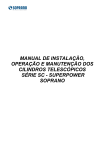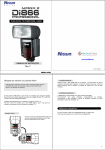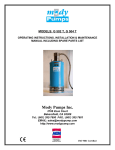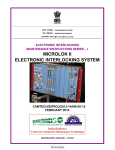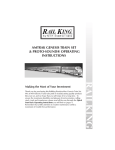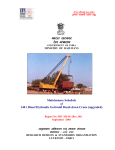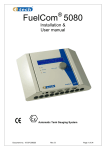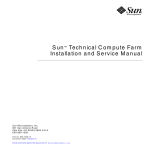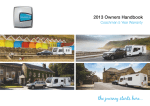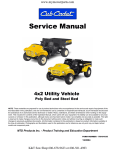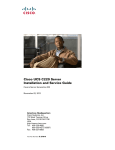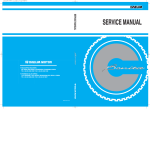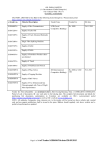Download English
Transcript
dsoy dk;Zky;hu mi;ksx gsrq (For Official Use Only) Hkkjr ljdkj GOVERNMENT OF INDIA jsy ea=ky; MINISTRY OF RAILWAYS Handbook on General Maintenance Schedule for OHE Tower Wagon MarkMark-III CAMTECH/2002/E/TW/1.0 January, 2002 Centre for Advanced Maintenance TECHnology Execellence in Maintenance Maharajpur, GWALIOR - 474 005 FOREWORD Indian Railways uses large number of Tower wagons for maintenance of overhead equipment in electrified section. The proper maintenance of tower wagon is vital to ensure its availability and reliability. CAMTECH has prepared this hand book to cover all essential aspects of tower wagon maintenance. This handbook describes various maintenance schedules, trouble shooting instructions and do's and don'ts. It also covers operating and maintenance instructions for OHE car driver. I am sure the book will prove to be very useful to our field personnel to carry out their work more effectively and efficiently. CAMTECH, GWALIOR DATE: 17.01.02 M.L.GUPTA EXECUTIVE DIRECTOR PREFACE Tower Wagon is an important vehicle for regular inspection and attending breakdown of O.H.E. Therefore proper maintenance of tower wagon is necessary to ensure the reliability and availability of tower wagon in emergency and for regular maintenance of OHE. This handbook on "Maintenance of Tower Wagon" has been prepared by CAMTECH with the objective of making our maintenance personnel aware to correct maintenance and maintenance techniques adopted in field It is clarified that this handbook does not supersede any provisions laid down by RDSO or Railway Board. I am sincerely thankful to Director(TI)/RDSO/LKO for his valuable suggestions and comments. I am also thankful to all field personnel who helped us in preparing this handbook. Technological upgradation and learning is a continuous process. Hence feel free to write to us for any addition/ modification in this handbook. We shall highly appreciate your contribution in this direction. CAMTECH, GWALIOR DATE: 17.01.02 RANDHAWA SUHAG DIRECTOR/ELECT CONTENTS Chapter No. Contents Page No. FOREWORD PREFACE CONTENTS CORRECTION SLIP v vii ix xv 1. INTRODUCTION 1.1 Body Structure 01 02 2. LIFTING, SWIVELING PLATFORM AND PANTOGRAPH 2.1 Pantograph 03 04 3 MAINTENANCE OF ENGINE 3.1 'A; Check Every Day 3.2 'B' Check Every 300 Hours or 6 months which ever is earlier 3.3 'C' Check Every 1500 Hours or 6 months which ever is earlier 3.4 'D' Check Every 6000 Hours or 2 years which ever is earlier 3.5 'E' Check 06 06 09 13 16 17 Chapter No. 4 Contents Page No. TRANSMISSION 4.1 4.2 4.3 4.4 4.5 4.6 4.7 Maintenance of VOITH Hydraulic Transmission Maintenance of Hindustan Motor Hydraulic Transmission Trouble Shooting of H.M. Hydraulic Transimission Maintenance of VENTRA Drop Gear Box VENTRA Axle Drive Maintenance Schedule Maintenance of KPC Hydraulic Transmission K.P.C. Axle drive Maintenance Schedule 18 19 20 23 26 27 29 34 5. BRAKE SYSTEM 5.1 Air Pressure System 5.2 Maintenance of the Valves 37 37 44 6. TXR CHECKING 46 7. ELECTRICAL MAINTENANCE 7.1 Trip Schedule 7.2 Fortnightly Schedule 7.3 Monthly Schedule 7.4 Quarterly Schedule 7.5 Half Yearly Schedule 7.6 Yearly Schedule 47 47 48 48 49 49 49 Chapter No. Contents Page No. 8. MAINTENANCE OF BATTERY 50 8.1 Hydrometer reading and battery condition 51 9. IMPORTANT OPERATING AND MAINTENANCE INSTRUCTIONS FOR DRIVERS OF OHE CAR 9.1 9.2 9.3 9.4 10. Description and operating principle Stationary Condition Running Condition Change of Cabin DO'S and DON'TS 10.1 Do's 10.2 Don'ts 10.3 Suggestion for achieving zero Failure 10.4 Maintenance Step for Engine Annexure A - Annexure B- Techanical Specification of Tower Wagon Oil Change 52 52 56 59 59 60 60 61 62 63 64 73 76 REFERENCE ****** ISSUE OF CORRECTION SLIPS The correction slips to be issued in future for this handbook will be numbered as follows: CAMTECH/2001/E/CL/TW # XX date----------Where “XX” is the serial number of the concerned correction slip (starting from 01 onwards). CORRECTION SLIPS ISSUED Sr. No. Date of issue Page no. and Item no. modified Remarks CAMTECH/2002/E/TW/1.0 CHAPTER 1 INTRODUCTION Tower wagon has a key role in the maintenance of OHE and for attending of breakdown, restoration of damaged OHE equipment and erection of small length catenary and contact wires. It is also used for inspection, patrolling and maintenance of overhead equipment. The satisfactory up keep of tower wagon is therefore of utmost importance. It is the direct responsibility of tower wagon incharge to ensure that the tower wagon is maintained satisfactorily and is available always for attending OHE maintenance and for use in the event of OHE breakdown. This handbook deals with details of schedule maintenance to be carried out by OHE depots. POH facilities are not available in OHE depots and therefore POH of complete tower wagon including engine, running gear arrangement, brake rigging, wheel and axle, roller bearing, pneumatic valves, lifting and swiveling platform, hydraulic transmission, axle drive, bogie, electrical equipment and all under frame equipment shall be carried out at an interval of three years in an EMU shop/ Electric Loco shed/ Electric Loco workshop as decided by CEE. This handbook does not include details of work to be carried during POH of tower wagon in EMU shop/Electric Loco shed/Electric Handbook on General Maintenance Schedule for January, 2002 4 Wheeler OHE Tower Wagon, Mark III 2 CAMTECH/2002/E/TW/1.0 Loco workshop. Similarly work to be carried out by TXR during monthly examination is not included in this handbook as this handbook is intended for the staff of OHE depots only. 1.1 BODY STRUCTURE The body of the tower wagon is built up by iron sheets supported on the large frame work erected on the under frame. Tower wagon’s inside is divided into two driving cabs with seating arrangement for driver and supervisor and central portion. The central portion is having various racks and pigeon holes on one side and lattice enclosure on the other side. A space is left at the centre for the staff to work. All the enclosures are used for preserving the materials and tools for attending OHE maintenance and breakdowns. The roof of the tower wagon is mounted with iron corrugated sheet and strengthen for staff to work on the top. It is also mounted with lifting and swiveling platform at one end while the other end is having pantograph. ***** Handbook on "General Maintenance Schedule for 4 Wheeler OHE Tower Wagon, Mark III" January, 2002 3 CAMTECH/2002/E/TW/1.0 CHAPTER 2 LIFTING AND SWIVELING PLATFORM AND PANTOGRAPH Lifting and swiveling platform measuring with in the permissible limits is mounted on the one end of the roof for raising its height and rotating it by 360°. The arrangement is such that when the maintenance staff has to work near the structure , the platform can be rotated so that it reaches the structure and facilitates the working of the staff. Similarly height of the plat- form can be adjusted to suit the working spot on overhead equipment. This has got the chain pulley and gear system and having its operating arrangement on the top by means of a handle. The platform is surrounded from all the three sides (other than panto side) with collapsible railing of pipe. These railings can be lifted up as and when the staff works on the roof otherwise these are normally kept lowered on the platform and thus the moving dimensions are maintained. Handbook on "General Maintenance Schedule for 4 Wheeler OHE Tower Wagon, Mark III" January, 2002 4 CAMTECH/2002/E/TW/1.0 2.1 PANTO GRAPH Pantograph is similar to that used for AC loco but having spring control only. The required pressure of panto is adjusted by means of control springs at the bottom. It is mounted on the centre line along the roof of the tower wagon at the other end. The height of the panto is adjusted suitably to meet the requirement of overhead equipment On panto pan the marking of stagger is done. Similarly the height gauge is also fitted to the pantograph. This facilitates recording of the stagger and height of the contact wire respectively. FIGURE 2.1 PANTOGRAPH LOWERED CONDITION Handbook on "General Maintenance Schedule for 4 Wheeler OHE Tower Wagon, Mark III" January, 2002 5 CAMTECH/2002/E/TW/1.0 FIGURE 2.2 PANTOGRAPH RAISED CONDITION Details of figure 2.1 and 2.2 S. 1. 2. 3. 4. 5. 6. 7. 8. 9. Details Base Horizontal Spindle Lower Arm Yoke Tube Upper Tube Thrust Rod Pivot point Transverse Tube S. 10. 11. 12. 13. 14. 15. 16. 17. 18. Details Joint of upper tube Spring Box Positioning Link Lifting Spring Servo Motor Tie rod insulator horn Collector Insulated Horn Support Insulator ***** Handbook on "General Maintenance Schedule for 4 Wheeler OHE Tower Wagon, Mark III" January, 2002 6 CAMTECH/2002/E/TW/1.0 CHAPTER 3 MAINTENANCE OF ENGINE 3.1 ‘A’ CHECK EVERY DAY S. No Maintenance Steps Remarks 1. Check previous day’s Correct as required. engine log book. 2. Drain water and sediment from fuel Before filter through drain engine. cock. 3. starting the Must be slightly less than Check engine oil level or equal to ‘H’ mark on and top up if dip stick when engine is necessary. stopped and has stood for 20 minutes or more (must be measured after all oil is drained back into oil pan). Handbook on "General Maintenance Schedule for 4 Wheeler OHE Tower Wagon, Mark III" January, 2002 7 CAMTECH/2002/E/TW/1.0 S. Maintenance Steps No 4. Check for fuel, oil, water and exhaust leaks. 5. Fill radiator/surge tank with treated water (chromate concentration 3500 PPM) 6. 7. 8. 9. Remarks Correct if leaking. Radiator cap must be firmly tightened back into the radiator/surge tank neck. Engine must not be operated without the aeration and overheating of the coolant. Check engine radiator water level. Check air cleaner oil Use clean engine oil. level and change oil, if required (If oil bath type). Clean dustpan and pre- cleaner of dry type air cleaner. Check air line Correct as required. connections for leaks. Remove and clean air Fill with clean oil upto compressor breather, if the mark. equipped. Drain air receiver tank at the beginning of every day and then close the drain cock. Handbook on "General Maintenance Schedule for 4 Wheeler OHE Tower Wagon, Mark III" January, 2002 8 CAMTECH/2002/E/TW/1.0 S. No 10. Maintenance Steps Clean breather. Remarks crankcase Discard paper type element if clogged. Check oil level in Check for leaks. Use 11. hydraulic governor, if engine oil for topping up provided (as shown in fig. 3.1) FIGURE 3.1 S. Maintenance No Steps 12. Start the engine and note the oil pressure both at idling and maximum speed. CHECKING OF OIL LEVEL Remarks If there is a change in oil pressure from that recorded in the log book on earlier occasion then stop engine and check through trouble shooting technique the cause for oil pressure change and correct if necessary (for assistance in diagnosing the change in oil pressure call your service representative if necessary. Handbook on "General Maintenance Schedule for 4 Wheeler OHE Tower Wagon, Mark III" January, 2002 9 CAMTECH/2002/E/TW/1.0 S. Maintenance Steps Remarks No 13. Record oil pressure. Refer operation and maintenance manual for lub oil pressure limits. 14. Fill fuel tank at the Use clean fuel and a end of the day. strainer. Also clean the cap and surrounding area before opening the filler cap. Fill fuel at end of the day allowing diesel to settle. Drain sediment from fuel filter water separator bowl. 3.2 ‘B’ CHECK EVERY 300 HOURS or 6 MONTHS WHICH EVER IS EARLIER S. Maintenance Steps Remarks No 1. Repeat all maintenance -steps of ‘A’check 2. Change engine oil. When lub oil is examined through lub oil analysis in a laboratory, oil change period may be extended. In such cases, refer to your service representative. 3. Fit new lubricating oil Inspect the changed filter full flow filter element. element and check for metal particles and oil sludging/oxidation. Handbook on "General Maintenance Schedule for 4 Wheeler OHE Tower Wagon, Mark III" January, 2002 10 CAMTECH/2002/E/TW/1.0 S. No 4. Maintenance Steps Remarks Remove, clean and inspect dry type air cleaner element. Remove and clean dustpan. Inspect FIG. 3.2 AIR CLEANER element for holes and tears. Check gaskets and ‘O’ rings for Blow out dust with damage. compressed air in the opposite direction of the normal air flow. If very dirty , wash in solution of warm water. (48.9°C-60°C) and non sludging detergent. Allow it to dry first then use compressed air. Replace if washed two times. Caution : Excess air pressure will damage paper. Air nozzle FIG. 3.3 must be kept at least 8” from ELEMENT the element. Must not be used CHECKING if even one pin hole exists. WITH ELECTRIC Discard element if punctured and also change gasket along with element. 5. Clean oil bath air ----cleaner tray screen. Handbook on "General Maintenance Schedule for 4 Wheeler OHE Tower Wagon, Mark III" January, 2002 11 CAMTECH/2002/E/TW/1.0 S. No 6. 7. 8. 9. Maintenance Steps Remarks Change lubricating oil by-pass filter Record oil pressure element and gasket if provided. Clean float tank and/or main fuel tank ----breather. Check coolant PH value/concentration of DCA/chromate concentration (3500 PPM). Change corrosion resistor element if PH calue is below normal range 8.5 – 10.5. Check chromate concentration at 3500 PPM. Check magnesium plate in assembly corrosion resistor. Change water filter element. Check magnesium plate for pitting or being eaten away. Change if more than 50% of area is lost. Use DCA service element or chromate element bags AR 95679 if concentration is low. Clean shell fuel filter. Change element when restriction exceeds vacuum 20.32cm of mercury. Use same oil as used in oil pan. 10. Change fuel filter element washer and ‘O’ ring on mounting bolt. 11. Check oil in aneroid control, If equipped. Handbook on "General Maintenance Schedule for 4 Wheeler OHE Tower Wagon, Mark III" January, 2002 12 CAMTECH/2002/E/TW/1.0 S. No Maintenance Steps Remarks Tighten belt tension (use ST – 1293) Check and adjust belts. New belts will stretch 12. within one hour of use. They must be readjusted. FIG. 3.4 CHECK BELT TENSION Tighten foundation bolts and flexible coupling 13. bolts of engine and alternator. ----- Check all air cleaner connections for cracks- Correct as required. 14. chafing etc. Tighten all air intake connections. 15. Check fan hub and drive. Clean/change 16. compressor element. Use special tool no. ST 845 or ST 893 for tightening the fan hub nut. Change element for air naturally aspirated breather engine. Clean screen for turbo engine. 17. Check throttle linkage. Handbook on "General Maintenance Schedule for 4 Wheeler OHE Tower Wagon, Mark III" ----- January, 2002 CAMTECH/2002/E/TW/1.0 3.3 13 ‘C’ CHECK EVERY 1500 HOURS or 1 YEAR WHICH EVER IS EARLIER S. Mainten Remarks No ance Steps 1. Repeat all maintenance steps of checks ‘A’ & ---‘B’. 2. It should start opening and open fully within range 73.9°C and 79.5°C or Check thermostat 76.6°C and 85° C. Discard operation. and fit new thermostat if operation is not satisfactory. 3. Check fan hub and Check mounting bolts and drive. bearing end play. 4. Check impeller water Correct if necessary. pump for play. 5. Check for turbocharger Correct as required. oil leaks. 6. Tighten to the specified Tighten turbocharger torque. Do not tighten mounting nuts. when engine is hot. 7. Check after cleaning dry type air cleaner element . If Check inlet air restriction in excess of restriction. 63.5cm water, a new element must be fitted. 8. Remove complete Clean oil bath air assembly and clean cleaner. inclusive of fixed screens. Handbook on "General Maintenance Schedule for 4 Wheeler OHE Tower Wagon, Mark III" January, 2002 CAMTECH/2002/E/TW/1.0 14 S. Mainten Remarks No ance Steps 9. Clean and tighten all ----electrical connections. 10. Check generator Replace and clean as brushes and required. commutators. 11. Clean entire engine. High pressure and soap water mixture preferred after spraying engine with cleanser taking care of protecting electrical system. 12. Tighten all mounting Tighten as required. Over bolts and nuts. tightening may result in distortion or damage. 13. Clean aneroid air Replace breather if breather. necessary. 14. Check engine blowby. 15. Clean radiator. Handbook on "General Maintenance Schedule for 4 Wheeler OHE Tower Wagon, Mark III" Readings in excess of recommended limits. Corrective action must be taken through analysis with the help of trouble shooting chart. Blow air through the radiator core in opposite direction to the normal flow of air, if working under dusty/dirty condition.(Reverse flushing operation) January, 2002 15 CAMTECH/2002/E/TW/1.0 S. No Mainten ance Steps Remarks 16. Check air compressor Check shaft and clearance. Adjust injectors and Clean fuel inlet connection valves. screens. Final adjustments must be carried out with 17. engine hot and with correct torque as specified (Refer O & M manual). Change 18. governor oil. 19. Check damper. hydraulic Use engine lubricating oil. oil/aneroid Check wobble and eccentricity/alignment vibration marks on rubber type. Discard damper if misalignment is more than 0 .16 cm. Handbook on "General Maintenance Schedule for 4 Wheeler OHE Tower Wagon, Mark III" January, 2002 16 CAMTECH/2002/E/TW/1.0 3.4 ‘D’ CHECK EVERY 6000 HOURS or 2 YEARS WHICH EVER IS EARLIER S. Maintenance Steps Remarks No 1. Repeat all maintenance -steps of checks ‘A’, ‘B’ & ‘C’. 2. Check exhaust and inlet -manifold nuts and capscrews. 3. Tighten all mounting -bolts and nuts. 4. Clean turbocharger -diffuser and impeller and check end float. 5. Check turbocharger Only end float on semi bearing clearances. floating bearing if in excess of limits, replace it. 6. Check crankshaft end If in excess of float. recommended limits, corrective action is indicated. 7. Clean injector inlet Must be done only if a screens performance deterioration is evident. Some of the indications for performance deterioration are. 1. Black smoke. Handbook on "General Maintenance Schedule for 4 Wheeler OHE Tower Wagon, Mark III" January, 2002 17 CAMTECH/2002/E/TW/1.0 S. No Maintenance Steps Remarks 2. 3. 4. 5. 6. 7. 8. 9. 3.5 Change in fuel manifold pressure. Loss of power. Malfunction of aneroid. Clean and calibrate all injectors. Check fuel pump calibration. Replace aneroid bellows and calibrate Replace fuel pump -filter screen and magnet. Steam clean engine. If steam is not available, then use clean soap water solution as outlined in ‘C’ check item – 11. 'E' CHECK Overhauling Of Engine After Two 'D' Check ****** Handbook on "General Maintenance Schedule for 4 Wheeler OHE Tower Wagon, Mark III" January, 2002 CAMTECH/2002/E/TW/1.0 18 CHAPTER 4 TRANSMISSION The transmission and control equipment were supplied by two firms viz. M/s Kirloskar Pneumatic Co. Ltd., Pune and M/s Venkateswara transmission private Ltd. (VENTRA) Hyderabad. Hydraulic transmission offered by M/S KPC is of their own design and that of M/s Ventra is of Hindustan Motors. However five numbers 4 wheeler tower wagons were provided with Voith transmission system. A common power pack is used for both the two designs. A Kirloskar Cummins Ltd. model N-743-L naturally aspirated diesel engine developing 210 horsepower at 2100 rpm has been used. The transmission of both powers from diesel engine to wheels is by means of hydrodynamic system incorporating torque converter and gears. The final power transmission in both designs is through carden shaft and axle drives. In the KPC design the transmission output is directly connected to the axle drive on the rear axle by means of a long cardan shaft using axle drives of two different overall gear ratios. This transmission also incorporates reversing arrangements with the use of plate clutch unit. In the VENTRA design the transmission output is connected to the axle drive through an intermediate gearbox of a differential gear unit and a hydrodynamic torque converter incorporating speed change provision. The final drive from diesel engine is through a slip- clutch assembly properly aligned with in the engine fly-- wheel housing. Handbook on "General Maintenance Schedule for 4 Wheeler OHE Tower Wagon, Mark III" January, 2002 19 CAMTECH/2002/E/TW/1.0 4.1 MAINTENANCE TRANSMISSION OF VOITH HYDRAULIC 4.1.1 Maintenance Schedules Maintenance interval Work to be performed 20,000 km Check oil level 300,000 km Oil change, inspection of control parts, replacement of filter, replacement of disposable filter. 900,000 km Major overhaul 4.1.1.1 Maintenance after 20,000 km Check the oil level. 4.1.1.2 Maintenance after 300,000 km a) Oil change Under normal operating conditions, the oil filling lasts for a distance of approx.. 300,000km . This period can be extended if the oil sample is still with in the tolerance of the specification for new oil. For changing the oil, drain it from valve while it is at operating temperature and drain the oil cooler too. If oil of a different approved brand is to be filled in, flush the transmission and cooling system with half the quantity of the new oil needed for a complete fill. Handbook on "General Maintenance Schedule for 4 Wheeler OHE Tower Wagon, Mark III" January, 2002 CAMTECH/2002/E/TW/1.0 20 b) Replace all filters. For this purpose, drain off the oil first, then remove the filters, take off the caps and remove filter elements. c) Check control parts such as governor, standstill detector valve, operating cylinder, and main control valve for proper operation, leakage and wear. 4.1.1.3 Major Overhaul A major over haul of the transmission is recommended after approx. 900,000 km of operation, depending on operating conditions and duty. During this over haul, the transmission is stripped as far as necessary. Bearing labyrinth rings, shaft seats etc. are inspected and damaged parts are replaced. 4.2 MAINTENANCE OF HINDUSTAN HYDRAULIC TRANSMISSION MOTOR 4.2.1 Control Linkage Check the transmission shift control linkage and the directional linkage to ensure that the linkages are free and that the selector levers are properly positioned. The Shift levers should engage in all shift tower positions freely. Inspect the linkages for binding, wear, cracks, breaks or defective cotter pins. Handbook on "General Maintenance Schedule for 4 Wheeler OHE Tower Wagon, Mark III" January, 2002 CAMTECH/2002/E/TW/1.0 21 4.2.2 Cold Oil Level Check The cold check (engine not running) is made to determine if there is sufficient oil to safely start the engine - especially if the vehicle has been idle. The oil level should be at or near the full-level check plug. Some transmissions have one plug, others have two plugs, an ADD and a FULL plug. 4.2.3 Hot Level Check Oil level must be checked with the engine running at 1000 rpm, transmission in neutral and with the transmission at normal operating temperature (82.3°C - 93.4°C). The upper check plug (if there are two plugs) indicates the full oil level while the lower plug is the add level. The oil must be maintained at the FULL level. If there is only one check plug, the oil level must be maintained at this level. Add oil if necessary to bring the level to the FULL mark. 4.2.4 Oil, Filter Change The oil should be changed every 1000 hours of operation or sooner, depending upon operating conditions. Also, the oil must be changed whenever there are traces of dirt or evidence of high temperature indicated by discoloration or strong odor. The filter screen in the sump should be removed and cleaned with mineral spirits at each oil change. The filter elements should be replaced at each oil change and at 200 hour intervals between oil changes. Handbook on "General Maintenance Schedule for 4 Wheeler OHE Tower Wagon, Mark III" January, 2002 CAMTECH/2002/E/TW/1.0 22 The filter shells should be cleaned. New gaskets and seal rings must be used when replacing filter elements. After installation, check the filter for oil leakage while the vehicle engine is running. 4.2.5 Keeping oil clean It is absolutely necessary that the oil put in the transmission be clean. Oil must be handled in clean containers, filler etc., to prevent foreign material from entering the system. 4.2.6 Filling Transmission At temperature above -23.3°C, pour hydraulic transmission fluid type C-2 into filler opening. At temperature below -23.3°C, an auxiliary preheat is required to raise the temperature in the sump. Use only C-2 fluids from approved manufacturers. 4.2.7 Care of Breather The breather should be kept clean at all times. It should be checked and cleaned regularly and as frequently as necessary, depending upon the operating conditions. A badly corroded or plugged breather restricts proper breathing, causing oil leaks. 4.2.8 Control Linkage Adjustment Manual shift linkage must be adjusted so that the operator's control is positioned to exactly match the detent position of the selector valve on the transmission. Adjust the linkage so that it can be freely connected without moving either the valve or the operator's control. Handbook on "General Maintenance Schedule for 4 Wheeler OHE Tower Wagon, Mark III" January, 2002 23 CAMTECH/2002/E/TW/1.0 Then operate the range selector lever, the directional selector lever and the output disconnect (if applicable) through each position. Make minor adjustments, if necessary, to insure that each of the selector levers seats in each position of the operator's control. Then inspect the control linkage for binding wear or breaks. 4.3 TROUBLE SHOOTING TRANSMISSION OF Causes HM HYDRAULIC Remedy A. LOW CLUTCH APPLY PRESSURE 1. 2. 3. 4. Low oil level Clogged oil strainer Clogged oil filter Inching control adjustment not fully retracted 5. Air leak at intake side of oil pump 6. External oil leakage 7. 8. B. 1. 2. Add oil to correct level Clean strainer Replace filter element Check, adjust linkage Check pump mounting bolts. Tighten bolts or replace gaskets Brake hydraulic (or air) Check brake residual pressure applying clutch pressure (brakes cutoff valve released); check brakes for full release. Internal failure Overhaul transmission, or repair subassembly OVERHEATING High oil Restore proper oil level Clutch failed Rebuild transmission Handbook on "General Maintenance Schedule for 4 Wheeler OHE Tower Wagon, Mark III" January, 2002 CAMTECH/2002/E/TW/1.0 24 Causes Remedy 3. Vehicle overloaded Reduce load 4. Low clutch apply Refer to A. pressure 5. Engine water overheated Correct engine overheating 6. Cooler oil water line Clean or replace line kinked or clogged C. AERATED (foaming) OIL 1. Incorrect type oil used 2. 3. 4. 5. D. 1. 2. 3. E. 1. 2. Change oil; use proper type High oil level Restore proper oil level Low oil level Restore proper oil level Air entering suction side Check oil pump bolts of oil pump and gasket Air entering at clutch Check plug seal and cutoff valve (air seal ring of valve. actuated) VEHICLE WILL NOT TRAVEL Low clutch apply pressure Refer at A Selector linkage broken or Repair or connect disconnected linkage Internal mechanical Overhaul failure transmission VEHICLE TRAVELS IN NEUTRAL WHEN ENGINE IS ACCELERATED Selector linkage out of Adjust linkage adjustment Clutch failed (won't Overhaul release) transmission Handbook on "General Maintenance Schedule for 4 Wheeler OHE Tower Wagon, Mark III" January, 2002 25 CAMTECH/2002/E/TW/1.0 Causes Remedy F. VEHICLE LACKS POWER AND ACCELERATION AT LOW SPEED 1. Low clutch apply pressure 2. Low converter out pressure 3. Engine malfunction 4. Aerated oil Refer to A Refer to A Check engine; refer to engine service manual Refer to C G. CLUTCH CUTOFF VALVE INEFFECTIVE 1. Valve or plug sticking 3. Brake apply air pressure not reaching air cylinder 4. Plunger sticking in air cylinder Rebuild control valve body assembly Check pressure at control valve (min-max limit -140.7 9.15 kg/cm2 2 kg/cm ) Check air cylinder (15.85 kg force required to stroke valve) Check operation of air cylinder 5. Air entering at valve (air actuated) Check operation of air cylinder (seals) 2. Brake apply hydraulic pressure incorrect Handbook on "General Maintenance Schedule for 4 Wheeler OHE Tower Wagon, Mark III" January, 2002 26 CAMTECH/2002/E/TW/1.0 4.4 MAINTENANCE OF VENTRA DROP GEAR BOX General Ventra drop gearbox is a single --stage gearbox, all the bearing and gear s are adequately rated to give a longer life. This gearbox transmits the power from converter/ transmission to the rear axle drive gearbox through carden shaft of adequate design. Description The input flange is key mounted on the input pinion shaft, which runs on the spherical roller bearings. The input pinion is meshed with out put gear, which is key mounted on the out put shaft. The out put flange is key mounted on out put shaft. The out put shaft runs on spherical roller bearings. The gears and bearing are lubricated through pipe by means of a Hypo pump mounted on the output shaft. Oil seals are provided at input and out put end to prevent the oil oozing through the end covers Maintenance 1. Daily oil level to be checked through the level plug /indicator, if necessary, top up the oil. 2. Daily check the oil leakage through input, out put oil seals, through the end cover s and through housing joints etc. if so, rectify the oil leakage by changing the new oil seals or by tightening the respective bolts and nuts. Handbook on "General Maintenance Schedule for 4 Wheeler OHE Tower Wagon, Mark III" January, 2002 27 CAMTECH/2002/E/TW/1.0 3. Once in a week take out the magnetic drain plug from the gear boxes and check for any wear out particles or debris, if heavier particles found, the gear box has to be opened and checked. 4. For the new gears, first oil changing period is one month Then once in three months, the specified oil to be changed Note-- Before changing the equivalent oil, clean the gearbox with kerosene or diesel. Then pour the equivalent oil and drain out 1/2 to 1 litre of the same oil through the drain plug. Then put the oil little above the level plug / indicator 5. Breather must be cleaned thoroughly once in three months. 4.5 VENTRA AXLE SCHEDULE DRIVE MAINTENANCE The final drive to the tower wagon is affected by the axle mounted right angle drive gear box. The input and intermediate shaft run spherical roller bearing. The axle also run on spherical roller bearing the gear box housings have been provided with oil pockets and gears and bearings get abundant lubrication. The bottom housing serves as the oil sump. Level, drain plug and inspection door have been provided for regular maintenance. Handbook on "General Maintenance Schedule for 4 Wheeler OHE Tower Wagon, Mark III" January, 2002 28 CAMTECH/2002/E/TW/1.0 1. Daily oil level to be checked through the level plug and if necessary top up with the same oil (please refer oil chart for quantity/grade). 2. Check for oil leakage through oil seals and housing joints. Seal are to be replaces or housings are to be tightened according to the prescribed tightened torque, if necessary. 3. Once in a fortnightly take out the magnetic drain plug from the gear box and check for any wear particles or debris; if heavier particles are found the gear box has to be inspected by opening the cover at the top. Note For Changing Oil For a new gear box, first oil change shall be done after one month. During changing, clean the gear box with kerosene or diesel after draining out the sump. Pour the recommended/equivalent oil and drain out 1/2 to 1 litre oil again. Close the drain. Fill the sump with specified quality. Period of changing oil - every three months. Handbook on "General Maintenance Schedule for 4 Wheeler OHE Tower Wagon, Mark III" January, 2002 29 CAMTECH/2002/E/TW/1.0 4.6 MAINTENANCE TRANSMISSION OF KPC HYDRAULIC 4.6.1 Maintenance 4.6.1.1 Hydraulic system a. The oil capacity of transmission is 20 litres. b. Oil level should be checked daily through the oil level gauge in transmission. Oil level should be checked at idling engine speed, it should be between high & low marks. c. Oil must be changed after 1000 Hrs. of operation. d. Drain valve is provided for draining the oil without loss. Connect hose to the drain valve and then open the valve. e. Fill the oil in transmission through breather cap hole. Run the engine and check the oil level. Replace the breather cap or alternatively, remove plug provided on cover top & fill oil. Refit plug after oil filling. Handbook on "General Maintenance Schedule for 4 Wheeler OHE Tower Wagon, Mark III" January, 2002 CAMTECH/2002/E/TW/1.0 30 f. Replace filter element as per recommendations. Remove the filter cover and replace filter element. Use new gasket, if necessary, for the filter cover. g. Suction strainer: Unscrew plug on top of strainer housing for strainer removal. Clean strainer throughly by flushing in clean diesel oil. All foreign particles must be removed from the strainer before refitting it. Ensure air tightness after replacing plug on housing strainer. Thread sealing compound may be used to avoid leakage of air in to the circuit. h. Remove the breather assembly every 1000 Hrs. of operation. Flush the oil breather assembly. 4.6.1.2 Inspection - Daily a. Check oil level. Add if necessary. b. Check all pipelines, end connections for leakages. Replace damaged parts to stop leakages. c. Check all pressure/ temperature gauges for proper functioning. Replace damaged gauge immediately. Handbook on "General Maintenance Schedule for 4 Wheeler OHE Tower Wagon, Mark III" January, 2002 31 CAMTECH/2002/E/TW/1.0 d. Check oil leakage from oil seal bolted joints. Replace damaged oil seals. Tighten loose bolts/ screw to stop leakages from joints. 4.6.1.3. Inspection - Weekly a Check strainer and clean. b Check filters element and clean if necessary. c Check and tighten all bolted joints including mounting bolts. 4.6.1.4 Inspection After Each 1000hrs Of Operation a Change oil in the sump and fill new recommended oil b Clean selector valve. c Check all gauges for their correctness. 4.6.1.5 Periodic Overhaul A complete over haul of the transmission should be done simultaneously with overhauling of engine . The period is aproximately4000Hrs . of operation or 18 month whichever is earlier. Handbook on "General Maintenance Schedule for 4 Wheeler OHE Tower Wagon, Mark III" January, 2002 32 CAMTECH/2002/E/TW/1.0 4.6.2 TROUBLE SHOOTING TRANSMISSION Symptom Overheating OF Cause a. Insufficient heat exchanger capacity. b. Insufficient cooling water flow. KPC a) b) c. Clutch slipping. c) d. Oil level too high. e. Improper oil . d) f. Low oil a) pressure b) c) HYDRAULIC Remedy Install heat exchanger of sufficient capacity. Check pipe lines and heat exchanger for clogging. Check correctness of pipe size used. Low clutch oil pressure (see low oil pressure). Correct oil level. e) Use only recommended oils. f) Replace clutch Clutch plates plates. warped Clogged a) Remove & clean strainer. strainer . Stuck pressure b) Remove selector regulation valve assembly piston in and clean piston. selector valve assembly. Broken piston c) Disassemble rings in clutches and clutches. replace piston rings. Handbook on "General Maintenance Schedule for 4 Wheeler OHE Tower Wagon, Mark III" January, 2002 CAMTECH/2002/E/TW/1.0 33 Symptom Cause Remedy d) Damaged or d) Remove oil pump. worn oil pump Replace damaged assly. /worn assly. e) Clogged or e) Remove orifice plugged orifice plate and clean . plate in selector valve assembly. f) Low oil level. f) Add. oil to maintain proper oil level. g) Foamed oil. g) Check for air leak in suction line. No oil a) Faulty pressure a) Replace pressure pressure gauge . gauge . b) Low oil level b) Check or emply sump gasekets,seals for . leakage. Replace parts causing leakage. Maintain correct oil level. c) Fully clogged c) Remove &clean it. oil strainer. d) Damaged oil d) Replace oil pump. pump. Poor a) Low oil a) Add oil to performance pressure. maintain oil level. b) Use recommended b) Improper oil. oil . Handbook on "General Maintenance Schedule for 4 Wheeler OHE Tower Wagon, Mark III" January, 2002 34 CAMTECH/2002/E/TW/1.0 Symptom Excessive Noise Neutral 4.7 Cause Remedy c) Clutch slipping c) Disassemble clutch assemblies. check clutch plates and replace worn-out or damaged plates. a) Air leak in a) Check and tighten suction line of all joints. Replace the sump. damaged end fittings/hoses /pipes. b) Bearing failure b) Disassemble transmission. Replace damaged bearings. a) clutch plates a) Replace clutch warped. plates. KPC AXLE DRIVE MAINTENANCE SCHEDULE 1. Periodic maintenance Daily - Check oil level daily. It should be at the upper mark. Refill the oil, if the level has dropped below the minimum mark. Be sure to use the same oil brand. Handbook on "General Maintenance Schedule for 4 Wheeler OHE Tower Wagon, Mark III" January, 2002 CAMTECH/2002/E/TW/1.0 35 Check the bolts and screws and re-tighten if necessary. Inspect the torque reaction rod assembly and its mounting to base frame. 2. Every 375,000 Kms Subject all parts to an intermediate inspection. Check the bearing pattern on the bevel gear drive. Check the taper roller bearings for proper axial clearances. 3. Every 750,000 Kms. Subject all components to a major inspection and replace if necessary. 4. Oil Change After a new axle drive has been in use for 50 Hrs., the oil must be changed. Further oil change must be made after every 6000 Hours of operation. Handbook on "General Maintenance Schedule for 4 Wheeler OHE Tower Wagon, Mark III" January, 2002 36 CAMTECH/2002/E/TW/1.0 Remove the oil drain plug to drain the oil from the drive. If excessive metal particle are detected on the magnetic plug or in the oil, it shows that some components have rubbed each other. Open the axle drive and inspect, Remove the plunger type pump and clean pump strainer. Clean the housing from oil sludge. Replace the drain plug. Fill with new filtered oil through the filler neck. 5. Axial clearance check, Tapered Roller Bearings: Proceed in accordance with the guidelines and instructions. The bearing clearance must be maintained. 6. Check of Bearing Pattern, Bevel Gear Drive: To enable this inspection the axle drive must be opened. Lightly coat three or four teeth on bevel pinion with blue colouring. Rotate the driven gear by hand. Check the bearing pattern on the contact surfaces. The bearing pattern should be centered on the working surface or pointing a little toward the minor diameter. If the bearing pattern falls short of this requirement, readjust. ***** Handbook on "General Maintenance Schedule for 4 Wheeler OHE Tower Wagon, Mark III" January, 2002 CAMTECH/2002/E/TW/1.0 37 CHAPTER 5 BRAKE SYSTEM 5.1 AIR PRESSURE SYSTEM 5.1.1 Introduction Air pressure system in the Tower car mark III carried out the following operations i) Operation of the brake cylinders ii) Control system iii) Signal Horns iv) Parking brake When the power pack of tower car works, the entire air pressure system is charged by the integrated diesel engine air compressor. The main reservoir pressure is kept between 7 to 8 kg/cm2 with the help of governor, time relay auto drain valve (fitted with main reservoir) and unloader. There is one another Safety valve set at 9.5 kg/cm2 which can save the air pressure system in the worst case, when the usual safety valve (unloader and auto drain valve with time relay) fails. Handbook on "General Maintenance Schedule for 4 Wheeler OHE Tower Wagon, Mark III" January, 2002 CAMTECH/2002/E/TW/1.0 38 Duplex pressure gauges have been provided in both the Dr cabins which will show the M.R. and B.P. of the air pressure system. Two nos. gauges have been also provided in the Driver's cabin to show the Brake cylinder pressure when brake is applied. Another two nos. gauge have been provided for control system (one in each Dr.’s cabin) One no. of pressure gauge has been provided on control box. Which will show the actual pressure receiving by the control system. There is one air pressure oiler fitted with service pipe line to control box to facilitate the lubrication of pneumatic valves and equipment fitted in control board. Condemned water from the system can be removed by means of drainage valve provided in air supply tanks. There are 4 nos. of brake cylinders (one for each wheel) to facilitate perfect brake on the tread of wheels from both sides. There are two spring brake actuators provided specially for parking brake. It can park the Tower car where there is no air in the system. In the normal running condition due to air pressure brake are in the released condition. It will function as emergency brakes when the air pressure drops below the spring brake hold off pressure, the spring pushes the piston and the push rod out to apply the brakes. Handbook on "General Maintenance Schedule for 4 Wheeler OHE Tower Wagon, Mark III" January, 2002 CAMTECH/2002/E/TW/1.0 39 5.1.2 Important valves and their functions. 5.1.2.1. C3W distributor valve The C3W distributor valve consists of the following major parts. i) ii) iii) iv) v) vi) vii) viii) Main valve Quiere service valve Inshot valve Cut off valve Double release valve Auxiliary reservoir check valve Freight to passenger change over device or lock. Application and release chokes. 5.1.2.2 Operation The compressed air from brake pipe charges into (CR) control reservoir of the C3W valve and auxiliary reservoir (AR) through cut off valves. when the BP pressure is reduced by the Driver's brake valve due to differential pressure across the main valve diaphragm, the hollow stem lefts and allow AR pressure into B.C (brake cylinder) through inshot valve. The B.C pressure also acts.on top of the upper diaphragm bringing the main diaphragm assembly down wards and finally to cap position. In this position B.C pressure is held against permissible leaks. Every time B.P. pressure is reduced in steps this phenomenon repeats. Handbook on "General Maintenance Schedule for 4 Wheeler OHE Tower Wagon, Mark III" January, 2002 CAMTECH/2002/E/TW/1.0 40 The quick service valve helps in quick propagation of B.P (Brake pressure) reduction through the length of the train also. When the B.P. (Brake pipe pressure) is increased by Driver's brake valve, the hollow stem of main valve is brought to normal position by neutralizing the pressure differential across the main valve diaphragm and the B.C. pressure is released through the hollow stem to the atmosphere. As in the application, the upper diaphragm balance against upward force and comes to the lap position. Everytime B.P. pressure is increased in steps, this phenomenon repeats. There is on lever provided in C3W valve, by pulling it, the brakes can be released manually. The passenger freight change over device helps to achieve required brake application and release timings depending on the type of service either frieght on passenger. 5.1.2.3. Spring brake actuator Function To produce braking forces at the wheel for parking brake. Operation In the normal running condition the chamber air is pressurized and the piston compresses the spring and the brakes are in released condition. Handbook on "General Maintenance Schedule for 4 Wheeler OHE Tower Wagon, Mark III" January, 2002 CAMTECH/2002/E/TW/1.0 41 5.1.2.4 Spring brake application (Parking brake) When the air pressure in the Chamber is depleted, the spring pushes the piston and thereby the push rod out and applies the brakes through the slack adjuster. 5.1.2.5 Emergency brake When the system air pressure drops below the spring brake hold off pressure, the spring pushes the piston and the push rod out to apply the brakes through the slack adjuster. Mechanical Release To release the brake temporarily for towing the vehicle, the wind off nut is unscrewed after loosening the lock nut, thus retracting the push rod. Brake Cylinder In tower car 4 nos. of brake cylinders have been used which have been fitted at rear end and front end. One brake cylinder works on each wheel. When C3W valve BC lines operates, the air pressure rush into the cylinder and compress the spring and ultimately push out the piston and apply the brake on wheels treads from both sides with the help of mechanical levers and brakes shoes. If the driver release the brake with the help of auto brake valve A9,the pressure is released by C3W valve as well as through shut off vent type. Handbook on "General Maintenance Schedule for 4 Wheeler OHE Tower Wagon, Mark III" January, 2002 CAMTECH/2002/E/TW/1.0 42 5.1.2.6 Auto Brake Valve (A-9 Automatic Valve) It is valve by which drivers can apply the brake to the tower car as well as release the brake to run the vehicle (Tower car) Description The A-9 Automatic Brake Valve is a compact self-lapping, pressure maintaining brake valve which is capable of graduating in application or release of tower wagon brakes. The A-9 Automatic Brake valve has five positions: Release, minimum Reduction, Full service, Over - reduction and emergency. The full service application position is preceded by a zone in which brake pipe air is supplied or exhausted in proportion to brake valve handle movement through this zone, thus providing the graduation of an automatic application or release of the tower wagon brakes. The A-9 Automatic Brake Valve consists of a self-lapping regulating portion, which supplies or exhausts the brake pipe pressure and a vent valve which is actuated only when the brake valve handle is placed in Emergency position for the purpose of venting brake pipe pressure at an emergency rate. Handbook on "General Maintenance Schedule for 4 Wheeler OHE Tower Wagon, Mark III" January, 2002 CAMTECH/2002/E/TW/1.0 43 5.1.2.7 Double check valve Function To charge a central line in a selected manner from two independent sources. Operation When a pressure differential exists between the two end ports, the higher air pressure forces the check valve over to seal against its seat on the low-pressure side. This closes the passage between the low pressure port and the common port in the body. Air then flows from the high-pressure port through the common port to the device under control. 5.1.2.8 A1 Check valve Check valves are used in pneumatic brake system to allow -compressed air to flow in one direction only. The A1 check valve is metal seated check valve and is used in compressor delivery line. When compressed air flows in the right direction, the valve of the check valve lifts by the upward air force acting underneath the valve and allows air to pass through the outlet connection. In case of reverse flow, the valve is pressed on its seat tightly due to air pressure acting on top face of the valve. 5.1.2.9 J1 Safety Valve The J1 safety valve is installed vertically in the main reservoir system, vents pressure at a pre determine setting to atmosphere in order to prevent excessive main reservoir pressure build up. Handbook on "General Maintenance Schedule for 4 Wheeler OHE Tower Wagon, Mark III" January, 2002 CAMTECH/2002/E/TW/1.0 44 5.1.2.10 Automatic Drain Valve The automatic drain valve automatically discharges precipitated moisture from a reservoir with each operating cycle of the control device. 5.1.2.11 J air filter The J-air filter function to assist in preventing the passage of dirt and moisture which may be mixed with the air flowing from the main reservoir into the air brake equipment. 5.2 MAINTENANACE OF THE VALVES 5.2.1 Cleaning, Inspecting andRepairing • With the brake valve completely disassembled, all parts must be cleaned and inspected. • All the parts (excepting rubber parts) must be washed in a suitable solvent that will dissolve oil or grease and permit all the parts to be thoroughly cleaned without abrasion. The exterior of the body must be thoroughly cleaned by means of a cloth or rag saturated with a suitable solvent. • All Gasket, Diaphragms, and "O" rings must be replaced. All Packing rings should be replaced. • Handbook on "General Maintenance Schedule for 4 Wheeler OHE Tower Wagon, Mark III" January, 2002 45 CAMTECH/2002/E/TW/1.0 • Clean all springs using a wire brush and suitable solvent and inspect for pitted marks distortion, or permanent set. Replace where necessary. • Replace all parts that are cracked, broken, worn excessively, damaged or in such a condition as would result in unsatisfactory operation. • The spring may be wire brushed to assist in the removal of rust and scale. After cleaning, blow all metal parts with a low pressure jet of clean and dry air. • Promptly blow the parts dry with low pressure jet of clean and dry air. • Discard the filter unit and replace with a new one. • Inspect all other parts. Reject and replace any part that is cracked, cut damaged, worn excessively or is in such a condition that would result in unsatisfactorily operation. • The spring must be replaced if it is rusted, distorted or has taken a permanent set. • Frequency of overhauling of valves is to be decided by depots depending upon the utilization of tower wagon. However overhauling is to be carried out at least once in year. NOTE : All the gauges and meters are to be caliberated once a year. Handbook on "General Maintenance Schedule for 4 Wheeler OHE Tower Wagon, Mark III" January, 2002 46 CAMTECH/2002/E/TW/1.0 CHAPTER 6 TXR CHECKING A general inspection of brake, control, wheel and axle and suspension should be done by depot's staff before going on trip. A monthly inspection of running gear, soundness and conditions of wheels and axle, underframe, undergear fittings, buffer height, brake rigging, roller bearing, axle box, laminated springs, horn check gap and wheel line gauge should be done by the TXR as per the relevant drawings issued by Jamalpur workshop of Eastern Railway. ****** Handbook on "General Maintenance Schedule for 4 Wheeler OHE Tower Wagon, Mark III" January, 2002 47 CAMTECH/2002/E/TW/1.0 CHAPTER 7 ELECTRICAL MAINTENANCE ELECTRICAL ITEMS (OTHER THAN BATTERIES) 7.1 TRIP SCHEDULE 7.1.1 Condition - Diesel engine running General examination a. Check for high temperature, unusual sound and odour of the following: • • • • b. Alternator Lube oil pump Engine tachometer Starting equipment Ensure the working of hour meter and battery charging: 7.1.2 Condition - Diesel engine stopped General examination Make visual examination of junction boxes, distributors, electrical control equipment and instruction for dirt, flashover, overheating, loose covers and screws, leads and wiring connections for tightness, presence of moisture and incipient damage due to rubbing and other defects. Handbook on "General Maintenance Schedule for 4 Wheeler OHE Tower Wagon, Mark III" January, 2002 CAMTECH/2002/E/TW/1.0 48 Lights Check operation of: a. Head and buffer lights b. Cab lights c. Gauge lights d. Warning and indicating lights e. Inspection lights f. Dimmer lights g. Flasher lights 7.2 FORTNIGHTLY SCHEDULE 7.2.1 Condition - Diesel engine stopped 7.3 • Check insulation resistance of reversible protected type plugs and ensure for earthing. • Check the condition and ensure proper working of all relays, pressure and tumbler switches, rectifiers and contactors etc. Adjust if required. • Clean and inspect contacts of engine starting press keys. MONTHLY SCHEDULE 7.3.1. Condition - Diesel engine stopped • Open cabinet doors of pneumatic and electrical control and blow out with clean and dry compressed air. Ensure that the equipment is dry sand clean. Handbook on "General Maintenance Schedule for 4 Wheeler OHE Tower Wagon, Mark III" January, 2002 49 CAMTECH/2002/E/TW/1.0 • 7.4 Check starter motor, alternator and engine tachometer. Blow off dirt with compressed air. Inspect carbon brushes, holders and commutators. Check brush pigtail. QUARTERLY SCHEDULE 7.4.1 Condition - Diesel engine running • Check and adjust alternator • Check engine tachometer with a master tachometer for correct and accurate operation. 7.4.2 Condition Diesel Stopped 7.5 • Check the complete circuit and wiring and rectify as required. • The alternator and self starter may be removed and inspected, connections checked and their working may also be checked. HALF YEARLY SCHEDULE 7.5.1 Condition - Diesel engine stopped Remove and repair alternator if condition warrants. 7.6 YEARLY SCHEDULE 7.6.1 Condition - Diesel engine stopped 7.6.1.1 Remove and overhaul the following electrical machines • • • Self starter Alternator Engine tachometer generator ***** Handbook on "General Maintenance Schedule for 4 Wheeler OHE Tower Wagon, Mark III" January, 2002 50 CAMTECH/2002/E/TW/1.0 CHAPTER 8 MAINTENANCE OF BATTERY The following simple instructions will, if observed have to obtain long life built into battery. • Keep Clamps and terminals clean Corrosion product has high resistance, cause power loss, and prevent full charging back. • Smear Terminals with Vaseline Vaseline film prevents corrosion (grease may contain metal soaps which attack lead and should not be used). • Top Up Regularly Water is lost during charging as gas or by evaporation. Low level of electrolyte will damage, 'dry', top of plates, make acid stronger and more destructive to plates. • Keep Vent plug tight To prevent electrolyte evaporation or splash. Handbook on "General Maintenance Schedule for 4 Wheeler OHE Tower Wagon, Mark III" January, 2002 51 CAMTECH/2002/E/TW/1.0 • Keep battery top clean and dry Dirt and moisture cause surface current leaks between top metal resulting in battery running down. • Use distilled or deionised water only. Ensure water will cause self-discharge or attack plates due to the impurities present in it. • Keep cable connection tight. Because loose connections cause power loss. • Keep hold downs firmly secured To prevent bouncing, container abrasion and damage. 8.1 HYDROMETER CONDITION READING Hydrometer reading Correct at 27° C 1.250 ± 0.005 1.170 ± 0.005 1.120 ± 0.005 1.100 or below AND BATTERY Battery Condition Fully Charged 75 % Charged 50 % charged must be recharged Keep return record of daily and monthly inspection. The monthly inspection included gravity and voltage readings of all shells, flushing down the battery, checking connectors and compartment vents. Handbook on "General Maintenance Schedule for 4 Wheeler OHE Tower Wagon, Mark III" January, 2002 52 CAMTECH/2002/E/TW/1.0 CHAPTER 9 IMPORTANT OPERATING AND MAINTENANCE INSTRUCTIONS FOR DRIVERS OF O.H.E. CAR. 9.1 DESCRIPTION AND OPERATING PRINCIPLE The following components are used in electro pneumatic system - 9.1.1 Station Selection Key Switch (CSI) A station selection switch is provided in both the drivers' cabin, which is key operated. Only one key is to be used for both the cabins so that the control system can be operated from only one cabin at a time. 9.1.2 MCB (CSO) A 15 ampere capacity Miniature Circuit Breaker (MCB) is provided in control system as a MAINS if due to any fault, current in the control system exceeds than 15 ampere, it will trip the control circuit automatically. Handbook on "General Maintenance Schedule for 4 Wheeler OHE Tower Wagon, Mark III" January, 2002 53 CAMTECH/2002/E/TW/1.0 9.1.3 Engine Operation Mode Selection Switch (Cs2) The engine mode selection switch is provided to select the engine mode of operation i.e. 1) Test 2) off 3) run. The engine can be started only in test mode and clutch selection is possible only in run mode. 9.1.4 Direction selection switch (CS4) The direction switch is provided to select the desired direction by engaging correspondence clutch. The switch has three positions i.e. Forward-NeutralReverse. The direction selection from neutral is possible only when the engine is operating in run mode. 9.1.5 Speed selector switch (CS5) Engine speed selector switch with 8 positions is provided to select the speed of engine. This can be rotated through 320 from position 0 to 7 in clockwise direction. To decrease the speed rotate it anticlock wise. No attempt should be made to rotate the switch from position 7 to 0 in clockwise direction. 9.1.6 Stand still detector (SSD) The stand still detector mounted on axle drive is provided to detect the stand still condition of OHE CAR. The clutch cannot be engaged in either direction unless OHE CAR is stationary. Handbook on "General Maintenance Schedule for 4 Wheeler OHE Tower Wagon, Mark III" January, 2002 CAMTECH/2002/E/TW/1.0 54 9.1.7 Clutch actuating cylinder (CAC) The clutch actuating cylinder mounted on transmission is provided for shifting the lever of selector valve to forward, neutral and reverse position. This is a pivot mounted double acting and spring centered air actuator. The rod of the cylinder is connected to the lever of selector valve of transmission. When operated the rod shifts the lever as per direction selection and hence the respective clutch is engaged. 9.1.8 Solenoid valve (SOV. 5) Its function is to start and run the engine. The coil of valve is energized by 24 volt DC supply. It can also be operated manually by tightening the screw provided on it. 9.1.9 Solenoid Valves (Sov. 1 to 4) These are also operated by 24 volts DC supply and used for speed control of engine with the help of CS3. 9.1.10 Solenoid Valve (SOV. 6) 3/2 way solenoid operated valve is used for supplying air to stand still detector when energised by 24 volt DC supply. Handbook on "General Maintenance Schedule for 4 Wheeler OHE Tower Wagon, Mark III" January, 2002 CAMTECH/2002/E/TW/1.0 55 9.1.11 Solenoid valve (SOV. 7 & 8) A 5/3 way solenoid operated valve is used for supplying air to the desired port of clutch actuating cylinder by energizing the corresponding solenoid. This in turn controls the movement of selector valve lever. 9.1.12 Flow control valves Flow control valve FC1, FC2, & FC3 are used as time delay valves in pneumatic circuit. 9.1.13 Pressure switches Pressure switches PS2 & PS3 are for forward/reverse clutch pressure for the safety of transmission .If the clutch pressure is below the set value 10Kg/cm2 on a pressure switch, it will not allow the operation of engine speed control switch even if speed is selected after clutch engagement. Pressure switch PS1 is pneumatically operated by 3/2 way solenoid valve through SSD. It is used for avoiding the clutch engagement without achieving the stand still condition of OHE car. 9.1.14 Lubricating oil pressure switch It is mounted on engine. It will stop the engine if the engine lubricating oil pressure is below 0.842 kg/cm2. Handbook on "General Maintenance Schedule for 4 Wheeler OHE Tower Wagon, Mark III" January, 2002 56 CAMTECH/2002/E/TW/1.0 9.1.15 Water temperature switch It is also mounted on engine and will bring down the engine RPM to idle from high if the engine cooling water temperature reaches above set value 204° F on it. 9.2 STATIONARY CONDITION On entering the Driver’s Cab, the Driver should check and observe the following: • Check visually all equipment for any visible defects as leakage in water, fuel, luboil, TC oil line or pneumatic pipe lines, loose joints, FIGURE 9.1 CONTROL PANEL etc. and rectify. Clean. Driver's cave inside and wind shields. • Ensure that the handle of the Driver’s brake Valve of the rear cabin is in “ISOLATING POSITION”. • Handle of the Driver’s Brake valve of the Driving Cabin should be in release and running position. • Start the engine as follows: • Switch on the ignition key. Handbook on "General Maintenance Schedule for 4 Wheeler OHE Tower Wagon, Mark III" January, 2002 57 CAMTECH/2002/E/TW/1.0 • Press the button (pink) for oil indication and simultaneously press the starter (green) push button, release the button once the engine starts. • Ensure F/R (forward/ Reverse) switch is in Neutral position. • Move the engine throttle to higher notch for fast charging of the MR/BP. • Pressure build up time : Check that MR pressure is build up from 0 to 7.5 kg/cm2 in 10 minutes. • Ensure MR pressure between 7 to 8kg/cm2. • Check brake pipe pressure to 5 kg/cm2. • Observe the brake cylinder pressure to be ‘zero’. If not, pull the manual release valve of the distributor valve for a short while. • Apply leak hole test : In this test mild steel plate of 8mm dia hole is to be provided at the end of BP pipe and ensure that pressure drop of BP is not more than 0.5 ±0.1 kg/cm2 in 5 minutes and pressure drop in MR is not more than 0.7kg/cm2 in 5 minutes. FIGURE 9.1 CHECKING BELT TENSION Handbook on "General Maintenance Schedule for 4 Wheeler OHE Tower Wagon, Mark III" January, 2002 CAMTECH/2002/E/TW/1.0 • • • • • • • • • • • 58 Check proper belt tension manually. Check the working of horn, wipers before moving the car. Once the system is charged then apply emergency brake application and observe BC pressure to be 3.8 kg, ± 0.1 kg/cm2 and BP 0 kg/ cm2. Release the brake and recharge the system. Ensure that brake application time is 6 to 9 sec. and brake releasing time is 10 to 15 sec. Check graduated application and release of brakes for proper lapping and number of steps (Minimum 6 Nos.) All the BC Isolating cock should be open and outer most angle cock of wagons & OHE car should be kept closed. Every time driver should ensure charging of BP by seeing the pressure gauge readings as well handle position. After BP is charged, he should wait for 5 minutes for complete charging of brake system including CR pressure and AR pressure etc. Driver must confirm availability of service brakes before moving the car. Isolating valve handle of R-Charger must be in down ward position; otherwise charging of distributor valve will not take place. Whenever quick release valve is operated for manual release of brake, driver should wait for recharging of brake system and confirm the availability of brakes again by bringing the handle to application position. Handbook on "General Maintenance Schedule for 4 Wheeler OHE Tower Wagon, Mark III" January, 2002 59 CAMTECH/2002/E/TW/1.0 9.3 RUNNING CONDITION • • • • 9.4 During the run, if brake application is required to reduce the speed, the handle of the Driver’s brake valve should be brought to Ist notch in the application range. Driver should reduce the BP to minimum value, as reduction of BP by 1.4 kg/cm2 will give full brake cylinder pressure of 3.8 kg/cm2. To operate the car on down gradient, short application and release of air brakes is recommended to maintain the specified speed and brake power. Spare sub assemblies. Should be made available in the OHE car for unit exchange basis in case of an emergency. This include BP hose, angle cock, Distributor Valve, relay valve etc. Independent emergency brake valve is provided in the cab (both ends facilitate the guard to initiate an emergency brake in case of emergency. CHANGE OF CABIN Apply emergency application and then remove the driver’s brake valve handle by bringing it quickly to isolating position. Switch off the ignition key. Change the cabin and repeat all the checks given under heading 9.2 ***** Handbook on "General Maintenance Schedule for 4 Wheeler OHE Tower Wagon, Mark III" January, 2002 CAMTECH/2002/E/TW/1.0 60 CHAPTER 10 DO’S AND DON’TS 10.1 DO's 1. 2. 3. 4. 5. 6. 7. 8. 9. 10. 11. 12. 13. Do keep the engine clean. Do pay particular attention to lubrication. Do use only approved grades of lubricating oil. Do keep all bolts and nuts tight. Do eliminate all air from the fuel system and keep all fuel oil unions air tight Do examine engine oil level in sump daily and replace if necessary. Do completely change engine oil in accordance with periodical attentions. Do renew element in lubricating oil filter in accordance with periodical attention. Do keep a check on the temperature of the cooling water Do attend immediately to fuel and lubricating oil leaks. Do keep essential spare in store. Do drain radiator if engine is being left idle in frosty weather. Do remove pressurized radiator filter cap (where fitted) before draining the coolant system. Handbook on "General Maintenance Schedule for 4 Wheeler OHE Tower Wagon, Mark III" January, 2002 CAMTECH/2002/E/TW/1.0 10.2 61 DON’Ts 1. Do not neglect the routine maintenance. 2. Do not race the engine in neutral. 3. Do not run the engine unless the gauge shows oil pressure. 4. Do not unnecessarily interfere with any adjustments. 5. Do not continue to run the engine if the cooling water boils. 6. Do not forget to keep the fan belt adjusted. 7. Do not continue to run the engine if black smoke is coming from the exhaust. 8. Do not omit to wipe the engine occasionally with a clean rag. 9. Do not use cotton waste or any fluffy cloth when cleaning. 10. Do not use unapproved brands of lubricating oil. 11. Do not store fuel oil in a galvanised container. 12. Do not subject the engine or vehicle to continuous overloading. 13. Do not load the vehicle beyond the stipulated payload. 14. Do not coast when travelling down hill. Handbook on "General Maintenance Schedule for 4 Wheeler OHE Tower Wagon, Mark III" January, 2002 62 CAMTECH/2002/E/TW/1.0 10.3 SUGGESTION FAILURES FOR ACHIEVING ZERO • Engine should run idle for 3 to 5 minutes before shutting it off after a full load operation.This allows adequate cool down of pistons, cylinder liners, bearing & turbocharger components. • Do not idle the engine for excessively long periods. • If the engine coolant temperature becomes too low, 60° C, raw fuel will wash the lubricating oil off the cylinder walls and dilute the crankcase oil. All the moving parts of the engine will not receive correct amount of lubrication. • Operate engine only on electrical mode & ensure all safety controls are functioning. • Do not over load the engine. • Do not remove radiator cap when engine is in operation or immediately after stopping the engine. • Perform periodic recommendations. • Ensure trained person carries out the schedule maintenance. • Ensure periodic health checks by experts. • Ensure quality of lubricants and fuel as per standards. • Correct problems when they are minor. • Use proper tools. maintenance Handbook on "General Maintenance Schedule for 4 Wheeler OHE Tower Wagon, Mark III" as per January, 2002 63 CAMTECH/2002/E/TW/1.0 10.4 • Use only CF4 grade lube oil for engine lubrication. • Do not operate the engine without thermostat • Do not crank the engine for more than 5-7 seconds . • Use only genuine parts while repairs/maintenance. MAINTENANCE STEPS FOR ENGINE • keep dirt out of engine. • Maintain a lubricating film on all bearing surfaces. • Regulate the engine fuel. • Control operating temperatures. • Guard against corrosion. • Let the engine breath. • Prevent over speeding • Know your engines condition • Correct troubles while they are simple. • Schedule and control your maintenance. ***** Handbook on "General Maintenance Schedule for 4 Wheeler OHE Tower Wagon, Mark III" January, 2002 64 CAMTECH/2002/E/TW/1.0 ANNEXURE - 'A' TECHNICAL SPECIFICATION OF TOWER WAGON Model Type Track Gauge Axle classification No. of axles Nominal axle load Tractive Effort vs Speed Curve No. Adhesion factor Maximum speed Wheel dia Fuel tank capacity : : : : : : : OHE Tower Car Mark - III Diesel Hydraulic 1676 mm O - B' - O Driven/carrying Two/One/One 16t max. : : : : : VT/G-490 0.3 70 kmph 904.5 (Half worn) 300 litres 1. POWER PACK 1.1 Diesel Engine Make Model Installed Power Governed speed Operating cycles No. of cylinders Bore & Stroke Formation Engine breathing : : : : : : : : : Kirloskar Cummins Limited N - 743 212 HP @ 2100 rpm 2100 rpm four Six 130 x 152 In line Naturally aspirated Handbook on "General Maintenance Schedule for 4 Wheeler OHE Tower Wagon, Mark III" January, 2002 65 CAMTECH/2002/E/TW/1.0 2. TRANSMISSION 2.1 TECHNICAL DATA OF VENTRA TOWER WAGON 2.1.1 HYDRAULIC TRANSMISSION Make : Hindustan Motors Limited Model : Allison CRT - 5633 Type : Torque converter, three speed forward & reverse power shift transmission with drop gear box. Ratio : Forward I speed 3.95 : 1 II speed 1.96 :1 III speed 0.99 : 1 Reverse I speed 4.11 : 1 II speed 2.04 : 1 III speed 1.04 : 1 2.1.1.1 Drop gear Box Make Model Ratio : : : VENTRA GBM 0081 2.41 : 1 2.1.1.2. Axle drive gear box Make Model Ratio 2.1.1.3 : : : VENTRA GBM 0063 1.71 : 1 Carden shafts a. Make : Twindisc, USA Model : J - 230 - TS Between transmission & drop gear box output and axle drive gear box input Handbook on "General Maintenance Schedule for 4 Wheeler OHE Tower Wagon, Mark III" January, 2002 66 CAMTECH/2002/E/TW/1.0 2.1.1.4 Compressor 2.2 Make : Kirloskar Cummins Model : Single cylinder Engine : Engine mounted (13.2 cfm 100 PSI) TECHNICAL DATA TRANSMISSION Model : OF KPC HYDRAULIC KTC 100.20 Specifications Spec. Number : 780.430 Converter : 8-1600 M.S.Value : 330 RatioF/R : 1.333 : 1 Housing : Suitable for SAE - 1 Flyweel housing Dry weight : Sump capacity : 500 Kg Approximately 20 Litres (excluding pipe lines, heat exchanger) Pump capacity : 52 Litres/min. at engine speed of 1400 rpm Handbook on "General Maintenance Schedule for 4 Wheeler OHE Tower Wagon, Mark III" January, 2002 67 CAMTECH/2002/E/TW/1.0 2.2.1 Operating pressure at 2100 rpm engine speed a. b. c. Converter base pressure : Clutch engagement pr. : 2.0 to 4.5 kg/cm2 13.0 to 16.0 Kg/cm2 : 12.0Kg/cm2 minimum Clutch neutral pressure : 4.5 Kg/cm2 : 3.0 Kg/cm2 minimum 2.2.2 Operating temperature 2.2.3 Oil change interval : : 80°C to 110°C Replace every 1000 hours of operation or 3 months whichever is earlier. 2.2.4. Main filter element change: First change after 60 Hrs. interval of operation : Thereafter every 1000 Hrs. of operation. 2.2.5 Suction strainer cleaning : Every 10 -15 Hrs operation initially and once a week thereafter. 2.2.6 Recommended oils & Grease, Oils a. Hindustan petroleum : ENKLO NX 32 b. Indian Oil Corp. : Servo Torque 10 Handbook on "General Maintenance Schedule for 4 Wheeler OHE Tower Wagon, Mark III" January, 2002 68 CAMTECH/2002/E/TW/1.0 Grease a. Hindustan petroleum : b. c. Bharat Veedol : : Multipurpose Grease H Bharat MP Grease2 Veedol AP Grease Recommended torque tightening values for bolts/screws. Thread M10 M12 M14 M16 Torque in M-Kg (Lubricated threads) 4.2 7.0 10.8 16.2 All bolts must be tightened to its specified torque value. Use appropriate torque wrench for it. 2.3 TECHNICAL DATA OF KPC AXLE DRIVE Dry weight of axle drive exclusive of axle shaft Oil capacity Max. oil level below axle centre line Min. oil level below axle centre line Normal - axle load capacity 670 kg 12 Lit. 145 mm. 155 mm. 18 T. Max. 2.3.1 Gear ratio Total reduction Ratio Handbook on "General Maintenance Schedule for 4 Wheeler OHE Tower Wagon, Mark III" 4.289 : 1 January, 2002 69 CAMTECH/2002/E/TW/1.0 2.3.2 Torque Value Torque values for fastener tightening when threads are not lubricated while fitting (if lubricated use values lower by 20%) S. N Description 1 M 12 X 1.75 x 35 M 14 x 2 M 16 x 2 x 50 M 20 x 2 M20 x 1.5 x 140 M24 x 1.5 x 170 M24 x 3 x 330 M24 x 3 x 270 M10 x 2 x 60 M14 x 2 x 35 2 3 4 5 6 7 8 9 10 Screw Socket Head Bolt Hex. hd Screw Hex. hd Bolt Hex. Fitted Bolt Hex. hd. -- " --- " --- " --- " --- " -- Approx. Torque MKg. 12 14 21 41 46 46 71 71 21 14 2.3.3 Recommended Oils for the Axle Drive S.N 1 2 3 4 Name of Petroleum Co. Hindustan Petroleum Bharat Petroleum Indrol Indial Oil Handbook on "General Maintenance Schedule for 4 Wheeler OHE Tower Wagon, Mark III" Grade of Oil HP Gear Oil EP 90 Bharat Spirol 90 EP Hypod C 80 W/90 Servo gear HP 90 January, 2002 70 CAMTECH/2002/E/TW/1.0 3. CONTROL EQUIPMENT & INSTRUMENTS In the Tower Car there are two cabins and two control desks. The operator can drive the car from any one cabin in whichever direction he desires to travel. Adequate controls including gauges, instruments and safety devices are provided for safe and satisfactory operation of the car. The equipment is so arranged on the driver's desk and it is within easy reach. 3.1 Controls a. b. c. d. e. f. 3.2 Engine start & stop Engine throtle control Forward/reverse Speed changer Horn Provision for air brake and parking brake. Instruments & Gauges a. b. c. d. e. f. g. h. i. j. Engine RPM meter Engine Hour meter Engine oil pressure gauge Engine oil temp. gauge Engine cooling water temp. gauge Ammeter Transmission temperature gauge Transmission pressure gauge Air pressure gauges Speedometer Handbook on "General Maintenance Schedule for 4 Wheeler OHE Tower Wagon, Mark III" January, 2002 71 CAMTECH/2002/E/TW/1.0 3.3 Indication & warning lights a. b. c. d. 3.4 Safety devices a. b. c. d. e. 3.5 Water temperature too high. Transmission oil temperature too high. Low lubricating oil pressure Engine speed too high. Low radiator water level. Electrical Equipment a. b. 3.6 Engine on indication Battery charge indication Air on indication Forward/reverse/neutral-cum-speed indication 24VElectrical system complete with batteries, alternator/rectifier and starter motor provided. Switch for light provided. Storage Batteries 24V Lead acid batteries - one set is provided. ***** Handbook on "General Maintenance Schedule for 4 Wheeler OHE Tower Wagon, Mark III" January, 2002 72 CAMTECH/2002/E/TW/1.0 ANNEXURE 'B' OIL CHART Description Capacit y Hindustan Indian Petroleum Oil Corpn. Diesel 300 Engine Ltrs. Fuel/ Lube 32 Ltrs. Oil High Speed Diesel Hy-Lube - Extra 20W - 40 Caster Oil Bharat Petroleu m Corpn. Ltd. High High Speed Speed Diesel Diesel Deus OL Bharat 20 W - Actuma - 40 20 W - 40 High Speed diesel servo super 20W 40 Servo -CRT - 42 Ltrs Power 5633 Glide C - Transm 3 ission Transmissi C - 310 or C4 on C - 330 SAE 30 DROP 10 Ltrs. EP - 140 SERVO -GEAR GR.OIL GEAR BOX HP 140 Axle drive 40 Ltrs. EP - 140 Servo -gear box for each GR oil Gear gear box HP 140 Handbook on "General Maintenance Schedule for 4 Wheeler OHE Tower Wagon, Mark III" -- Bharat Spiral 140 EP Bharat spiral 140 EP January, 2002 73 CAMTECH/2002/E/TW/1.0 REFERENCE 1. Operating and maintenance manual bulletin 3243773 - 02 Cummmins India Ltd. 2. Instruction and Maintenance Manual By Kirloskar Pneumatic Co. Ltd. i. Electro Pneumatic control of 4 wheeler OHE Car ii. Hydraulic Transmission KTC 100 - 20 iii. Axle Drive V - 1719. 3. Operating and Maintenance Manual of VENTRA Locomotive Ltd. 4. Allison Transmission CRT 5633 By Hindustan Motors 5. Papers presented during the seminar at CAMTECH on maintenance of Tower Wagon. ***** Handbook on "General Maintenance Schedule for 4 Wheeler OHE Tower Wagon, Mark III" January, 2002
















































































